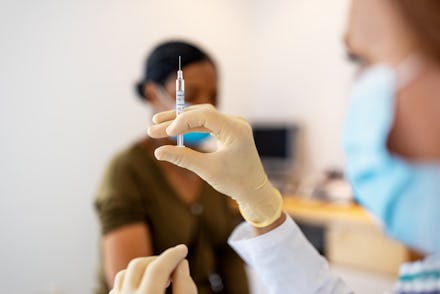Sorry, but you can absolutely still get COVID-19 after being vaccinated

Vaccination season is upon us and with it has come a lot of confusion. One of the things that has a lot of folks scratching their heads is that some people report contracting COVID-19 even after they’ve been vaccinated. Isn’t the whole point of getting vaccinated so that you won’t test positive? Not exactly, friends.
“Even the most effective vaccines that we have today are not 100% effective in preventing COVID-19,” says Nate Favini, a San Francisco-based internist and professor at USC’s Keck School of Medicine. The vaccines most people in this country have access to currently, Pfizer’s and Moderna’s, are 90-95% effective, Favini explains.
What that actually means is that the vaccines are 90-95% more effective than a placebo at preventing illness from the virus — not that 95% of people who get vaccinated won’t contract COVID-19. That sounds complicated, but it’s really all about symptoms: If you’re vaccinated, you have a pretty low chance of getting sick with the virus, but you can still catch it and be asymptomatic. And since the virus is still circulating, Favini wants us all to remember that all of us, even vaccinated people, can still contract the virus.
“If you get COVID-19 after being vaccinated, we believe that you are likely to have a much lower risk of a severe infection,” Favini says. That being said, fully vaccinated people will have a lower chance of contracting COVID-19 at all, because of the antibodies they’ve produced.
Also, the vaccines that require two doses require two doses for a reason: That second dose increases effectiveness. For example, the first Pfizer dose is about 50% effective in preventing COVID-19, and the second dose increases that protection to about 95%, so you are more likely to contract coronavirus between doses than after you’ve had both shots.
Even then, it takes time for the body to build up immunity after the shot. How long can vary from person to person, but experts assert that it takes about 10-14 days to produce enough antibodies to fend off illness. So even if you’ve had both doses, you can still get sick from COVID-19 if your body hasn’t finished building its anti-COVID antibody arsenal.
The dreaded new variants may be part of the reason we’re hearing about so many people testing positive after vaccination, Favini says. “Current vaccines have reduced effectiveness in preventing COVID-19 caused by certain new strains of coronavirus — specifically the B1351 strain that emerged in South Africa and the P1 lineage that emerged in Brazil,” he explains. Unfortunately, as the virus mutates, it’s possible that the vaccines may get even less effective. “As the new strains spread, the risk will increase,” says Favini.
None of this means that you should opt out of vaccination if you have legal and ethical access to it. “If you have the opportunity to get vaccinated, you should take it,” says Favini. He also thinks that we should take advantage of faster, more accessible testing, and recommends that if you are out and about in the world, you should get tested every few days. Favini knows, though, that some of us don’t have the easy access to testing they should, and while he is of the opinion that that is a major structural misstep, there are still things we can do to protect ourselves and each other.
“Folks should continue to follow public health measures like social distancing and mask wearing,” says Favini. This is important not just for us unvaccinated peasants but also for people who have been vaccinated. Yes, we are all tired of this, but we’ve made it this far, and we should be looking towards that light at the end of the pandemic. “When we start to reach herd immunity, it will be possible to further reduce public health restrictions,” Favini says.